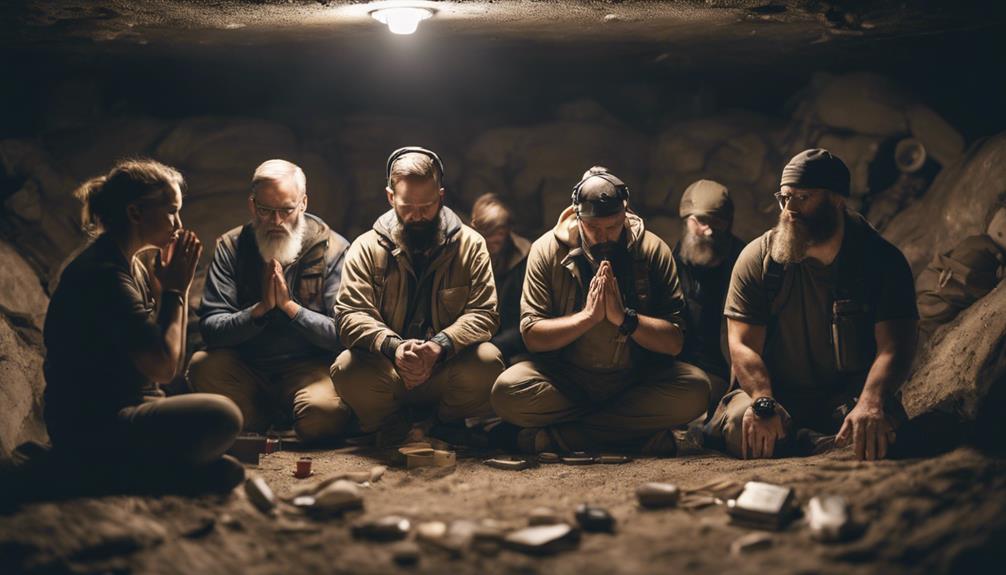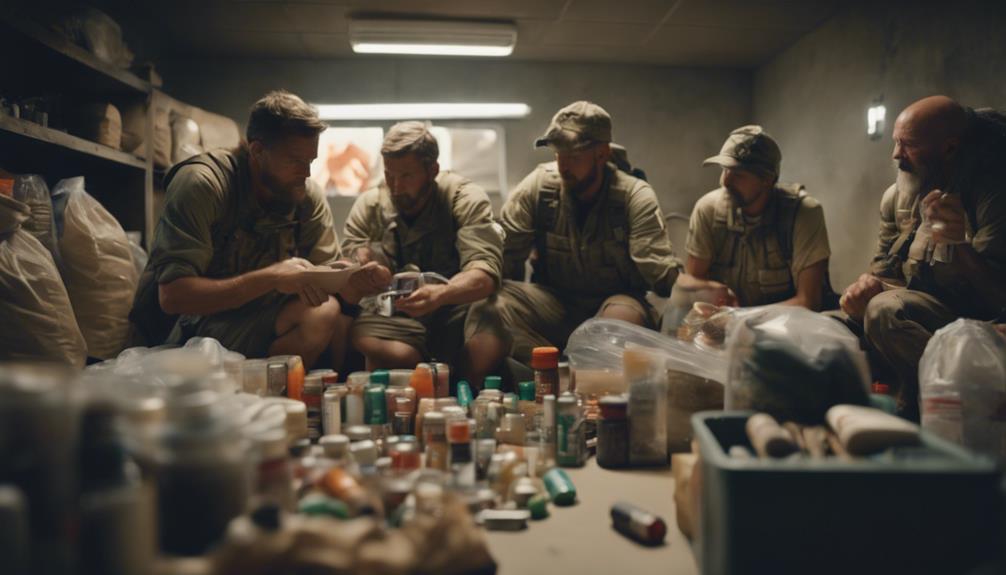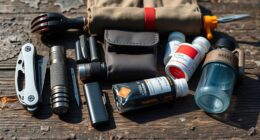You should definitely stock up on doomsday supplies now! Being prepared can really make a difference during emergencies. Start with water; aim for two quarts per person each day. Next, gather non-perishable food that your family loves. Don't forget a first aid kit with bandages and medicines. A reliable way to communicate and power sources like batteries or solar energy can also help. Plus, having fun games and books will keep spirits high during tough times. It's better to be ready than to regret it later, and there's so much more you can learn about staying safe and happy!
Key Takeaways
- Ensure a two-week food supply, gradually increasing to six months, focusing on non-perishable items and family dietary needs.
- Store at least 1 quart of water per person per day, using food-grade containers in cool, dark places to prevent contamination.
- Assemble a comprehensive medical kit with basic supplies, essential medications, and hygiene items to address potential health emergencies.
- Invest in portable communication devices like walkie-talkies and radios to stay informed and connected during crises.
- Incorporate entertainment and morale boosters, such as books and games, to maintain mental well-being and community bonds in challenging times.
Essential Water Supplies

When preparing for emergencies, securing essential water supplies is crucial for your survival. You'll want to store enough water for everyone in your household. A good rule is to have at least one quart per person per day for basic needs. If you can, aim for two quarts for better hydration.
Don't forget to set aside extra water for hygiene and cleaning, too!
Use food-grade containers for your water storage. Make sure these containers are tightly sealed to prevent contamination. Store them in a cool, dark area, away from harmful chemicals like gasoline or paint. This keeps your water fresh and safe. Additionally, it's important to consider the recommended amount of water to ensure all basic needs are met during an emergency.
You might even think about using gravity-fed systems or elevated tanks for easy access.
When it comes to purifying your water, boiling is the most reliable method. Just boil it for at least one minute to kill any nasty germs.
If you're in a pinch, you can use simple filters like cloth or charcoal before boiling.
Food Stockpiling Strategies

As you begin your journey toward food stockpiling, it's essential to set realistic goals that build gradually over time. Start with a two-week food supply. It's simple and manageable! Remember, budgeting is crucial to ensure you are spending wisely on your stockpile.
Once you've got that down, work toward a month, and eventually aim for six months or more. Remember, avoid buying too much at once. This helps prevent spoilage and keeps your food fresh.
Choose foods that you regularly eat, like rice, beans, and canned vegetables. This way, you won't waste anything! It's also important to consider your savings goals when planning your purchases.
Think about your family's needs too. If you have little ones or someone with special dietary requirements, stock up accordingly. Additionally, consider incorporating essential pantry staples into your stockpile to ensure you have a variety of meal options.
Proper storage is crucial! Use airtight containers to keep your food safe and extend its shelf life.
Label everything clearly, noting the food type and date. Store in a cool, dry place, away from light and pests. Keeping an eye on your credit score can also help you secure funds if needed for your stockpiling efforts.
Growing your own food can be fun, too! You'll save money and know exactly what you're eating.
Plus, consider buying from local farmers. This supports your community and gets you fresh produce.
Medical Kits and Supplies
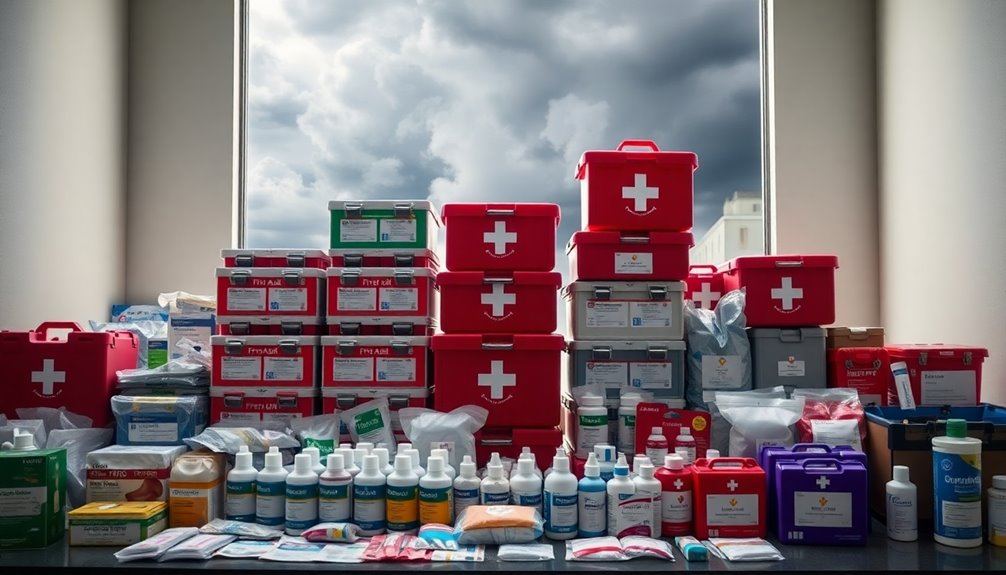
Having a well-stocked medical kit is crucial for any preparedness plan. You never know when a little cut or scrape might happen, so it's best to be ready! Start with basic supplies like absorbent compress dressings and adhesive bandages in various sizes.
Don't forget adhesive cloth tape, antibiotic ointment packets, and antiseptic wipes to keep those injuries clean.
Next, add some essential medications. You'll want aspirin packets, anti-diarrheals, and fever treatments. Make sure to include your prescription medications for at least a week.
Specialized equipment can also be a lifesaver. A C.A.T. tourniquet and Israeli style combat bandage can help in emergencies. Having a CPR mask with an O2 valve is a smart choice, too!
Lastly, think about hygiene. Stock up on sterile gauze pads, tweezers, and sanitation items like soap and toothpaste. Regular updates to kits ensure that your supplies remain effective and relevant over time.
These supplies ensure you're ready for anything. With the right medical kit, you can tackle minor injuries and stay healthy. So, start gathering your medical supplies today—it's a step toward peace of mind!
Shelter and Protection Options

While medical supplies are vital for your safety, shelter and protection options are equally important in any preparedness plan. Think of a custom-built underground bunker! These shelters come with amazing features, like Swiss-made NBC air filtration systems and gas-tight marine-grade doors.
You'll love the sturdy, 36-inch wide stairs that make it easy to get in and out. Safety is a top priority. Your bunker could have tamper-proof air pipes and solid brass check valves, ensuring clean air. In addition, the construction process ensures long-lasting reliability for your safety.
With 8-foot ceilings and a cozy interior, you won't feel cramped. Plus, you can customize it! Choose luxury options like granite counters, vinyl flooring, and even a hot water heater.
Don't worry about installation, either! Your shelter can fit snugly under your driveway or in your backyard. And if you live in a high water table area, they're water-tight!
With rust protection and a lifetime guarantee on air pipes, you can feel secure for years to come.
Communication Tools for Emergencies

In emergencies, effective communication can mean the difference between safety and chaos, so having the right tools is essential. You'll want to gather devices that keep you connected.
Walkie-talkies are fantastic! They're portable and don't need a network, with a range of about three miles. If you need more distance, consider CB radios or HAM radios, which work over several miles and can reach up to 20 miles. These devices can be especially useful in areas where air quality is compromised due to disasters, as they allow for communication without reliance on damaged infrastructure. Additionally, having a reliable means of communication is part of a well-rounded survival gear strategy to ensure you're prepared for any situation.
Don't forget about phones! Landlines are super reliable, especially when other services go down. Cellular phones let you text and receive alerts, which is crucial in remote areas. For places without local services, satellite phones can be a lifesaver. Real-time communication is critical for coordination, ensuring that all parties involved can respond effectively.
You can also stay informed with specialized radios like NOAA Weather Radios, which broadcast important warnings continuously. Additionally, public alert systems, like the Emergency Alert System, quickly spread important information over various media.
Finally, two-way radios make great backups for cell phones, ensuring you stay in touch.
Power Solutions for Preparedness

A reliable power solution is crucial for preparedness during emergencies. You'll want to consider various temporary power options to keep your home running smoothly.
Uninterruptible Power Supply (UPS) systems, like QuantumCore, offer backup power to keep important devices working. If you need something more portable, try Lithium Iron Phosphate batteries, which are eco-friendly and provide stable energy. These batteries are also used in Genesis systems that support quick response during emergencies.
Don't forget about portable emergency lights! They not only help you see in the dark but also serve as temporary power sources for first responders.
Power carts and packs are fantastic for quickly deploying energy to essential equipment during a crisis.
Solar power systems are another great choice! They harness the sun's energy, so you won't rely solely on traditional fuels. Portable solar generators can be lifesavers, offering immediate power on the go.
To make the most of these solutions, assess your power needs and think about how you can integrate solar panels into your emergency plans.
Must-Have Tools and Equipment
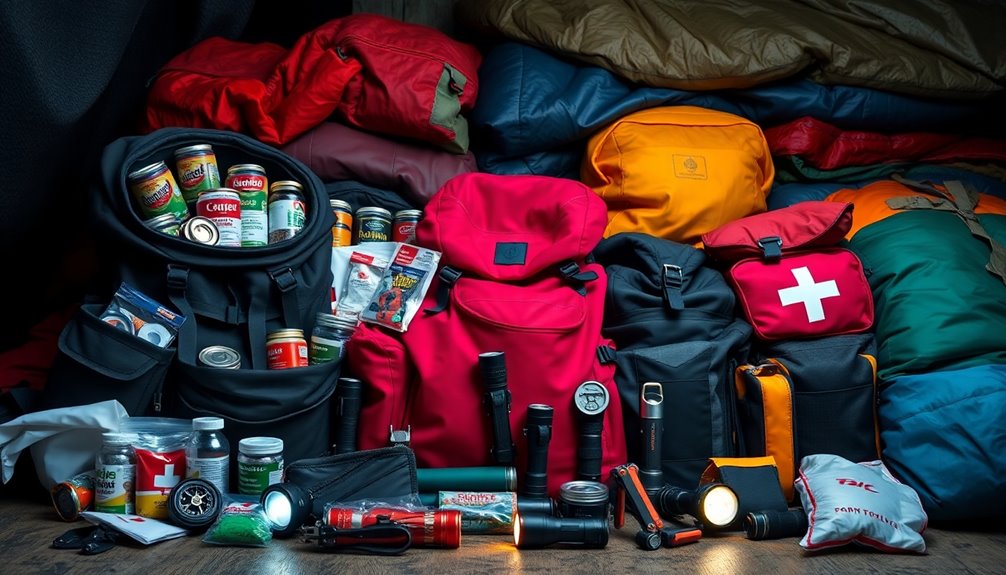
When preparing for emergencies, having the right tools and equipment can make all the difference in ensuring your safety and comfort.
First, think about shelter. A tarp can provide quick cover, while an emergency sleeping bag and warm blankets keep you cozy. Don't forget duct tape; it's perfect for repairs and makeshift solutions!
Next, you'll want fire-starting equipment. Grab some fire starters like flint and steel, matches, or lighters. A small stove or portable cooking kit will help you whip up meals. Remember to pack metal pots and a wide-mouth water container, too! A reliable water purifier ensures you have safe drinking water in emergencies.
Health is important, so a first aid kit with bandages and antiseptic wipes is a must. An Israeli compression bandage can help control bleeding in emergencies, and super glue works wonders for small cuts.
Also, include hygiene products like soap and a toothbrush.
Finally, communication tools are vital. A compass helps with navigation, while a hand-crank radio keeps you informed. A whistle can signal for help, and binoculars are great for scouting your surroundings.
With these must-have tools and equipment, you'll be well-prepared for anything!
Entertainment and Morale Boosters

Keeping spirits high during emergencies is crucial, and entertainment options can provide a much-needed distraction from stress. You can stock up on books and magazines to dive into different worlds. Additionally, engaging with pleasant scents through aromatherapy can also promote relaxation and improve mood. For instance, using essential oils for stress relief can create a calming atmosphere. Studies have shown that aromatherapy can alleviate symptoms of anxiety and depression, making it a valuable tool during tough times. Incorporating essential oils for mood enhancement into your space can further elevate your spirits.
Board games and puzzles are perfect for mental stimulation, bringing fun for everyone. Don't forget a deck of cards for quick games that can spark laughter!
Musical instruments or a portable radio can lift the mood with your favorite tunes. If you prefer digital, e-books or a tablet with pre-loaded content can keep boredom at bay.
Consider activities that boost morale, too! Grab some art supplies, like paints and sketchbooks, to unleash your creativity. This is especially important as having quality supplies on hand can enhance your overall experience during tough times.
Exercise equipment, like resistance bands, can help you stay active and energized. Incorporating aromatherapy techniques into your routine can also help in managing stress levels.
Group activities can build community. Think about getting materials for hosting meals or group games that encourage social interaction.
Lastly, don't overlook mental health support. Journaling materials can help you express your thoughts, while mindfulness guides can teach you to relax.
Stocking up on these entertainment and morale boosters will make tough times a little brighter!
Frequently Asked Questions
How Do I Properly Store Water Long-Term?
To store water long-term, use food-grade containers like HDPE or stainless steel.
Keep them sealed and in a cool, dark place to prevent bacteria. Rotate your water supply every six months for freshness.
It's also smart to clean containers before use and check for leaks.
If you want to be extra safe, you can add a bit of unscented bleach.
With these tips, you'll have fresh water ready when you need it!
What Are the Best Non-Perishable Food Options?
When you're looking for the best non-perishable food options, think about healthy choices like oats, whole wheat pasta, and brown rice.
They're packed with fiber and nutrients! Canned vegetables and fruits, like tomatoes and dried apricots, add flavor and vitamins to your meals.
Don't forget proteins like canned salmon or turkey jerky. For healthy fats, grab some peanut butter or nuts.
These foods can keep you energized and happy for a long time!
How Can I Create a Makeshift Shelter?
Creating a makeshift shelter can be fun and exciting!
Start by gathering sturdy branches and poles for your frame. You can make a lean-to or a tarp shelter quickly.
Cover it with leaves and natural materials to keep warm. Don't forget to leave an entrance and a spot for ventilation.
Make sure the ground is flat and dry, too.
With a little creativity, you'll have a cozy place to stay safe!
What Items Are Essential for Sanitation During Emergencies?
In emergencies, you'll need essential sanitation items to stay clean and healthy! Make sure you've got soap, hand sanitizer, and toilet paper.
Don't forget feminine hygiene products if needed. Portable toilets or sanitation bags are super helpful, too.
Water purification tablets will keep your drinking water safe. Also, grab some garbage bags for easy waste disposal.
With these supplies, you can keep things tidy and feel good during tough times!
How Often Should I Update My Emergency Supplies?
You should update your emergency supplies at least twice a year. A great way to remember is when the clocks change for Daylight Saving Time!
Check expiration dates on food, water, and medications. Look for any damage or leaks in containers. Keep an inventory list to track what needs restocking.
Conclusion
Now that you’ve learned about doomsday supplies, it’s time to take action! Stocking up can feel exciting, and it helps you feel safe and ready for anything. Remember, having enough water, food, and medical kits makes all the difference. Don’t forget fun items, too, like games, to keep spirits high! So, gather your supplies, plan ahead, and enjoy the peace of mind that comes with being prepared. You’ll be glad you did when the time comes! Also, don’t overlook the importance of essential survival gear such as a flashlight, batteries, and a multi-purpose tool. These items can be lifesavers in critical situations. Additionally, consider taking a first aid and survival skills course to further prepare yourself for any emergency. By being proactive and assembling a well-rounded supply kit, you can feel confident in your ability to handle whatever comes your way.





